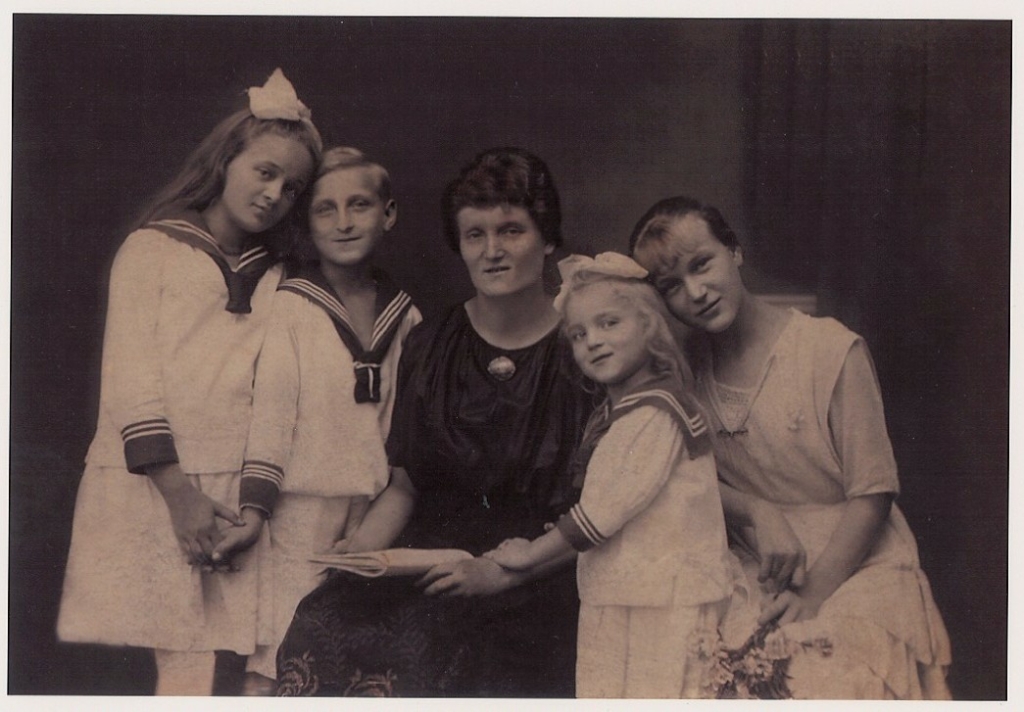
Charlotte Schössow Rebhun was the oldest of four children of Emil and Margarete Schössow from Berlin. Charlotte, like her friend Gertrude Spiro, was a Christian woman who had married a Jew. Charlotte’s husband Max Rebhun had moved from Poland to Germany and settled in Berlin, probably right after WWI. Max was arrested on Kristalnacht in 1938, and sent to Poland. His wife Charlotte followed him in 1939 with their two children Wolfgang and Adele, where, after the outbreak of the War, the family lived in the Warsaw Ghetto.
On August 20, 1942, Max Rebhun was arrested on the street in Warsaw and sent to Treblinka. Charlotte and the children fled to the Aryan side. They were living at 33 Krochmalna St. when later that year, she was approached about rescuing a nine-month-old Jewish infant.
The testimony given by Wolfgang and Adele Rebhun to the Yad Vashem upon their reunion with Pnina in March 1997, offers an eyewitness account of events surrounding her rescue from the point of view of adults who, as children, may have been told some things, and who may have assumed others. The account is short with many gaps, but their testimony is the best description we have of Pnina’s parents. As Wolfgang and Adele related to the Yad Vashem:
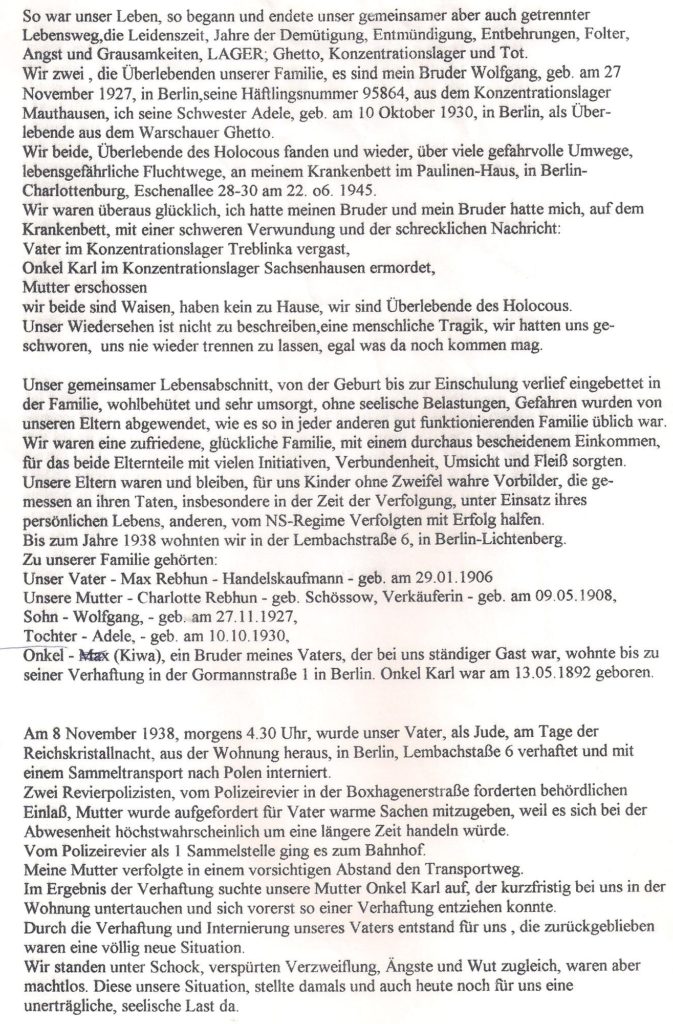
“Such was our life. So began and ended our common but also separate lives, our time of sorrow, years of humiliation, disempowerment, deprivation, torture, fear and cruelty – camp, ghetto, concentration camp, and death.
The two of us, our family’s survivors, are my brother Wolfgang, born on 27 November 1927 in Berlin, prisoner number 95864 from the Mauthausen concentration camp, and I, his sister Adele, born on October 10, 1930, in Berlin. We are survivors of the Warsaw ghetto.
After following many dangerous detours and perilous escape routes, the two of us, both survivors of the Holocaust, were reunited at my bedside in the Paulinen House at No. 28-30 Eschenallee 28-30, Berlin-Charlottenburg, on 22 June 1945.
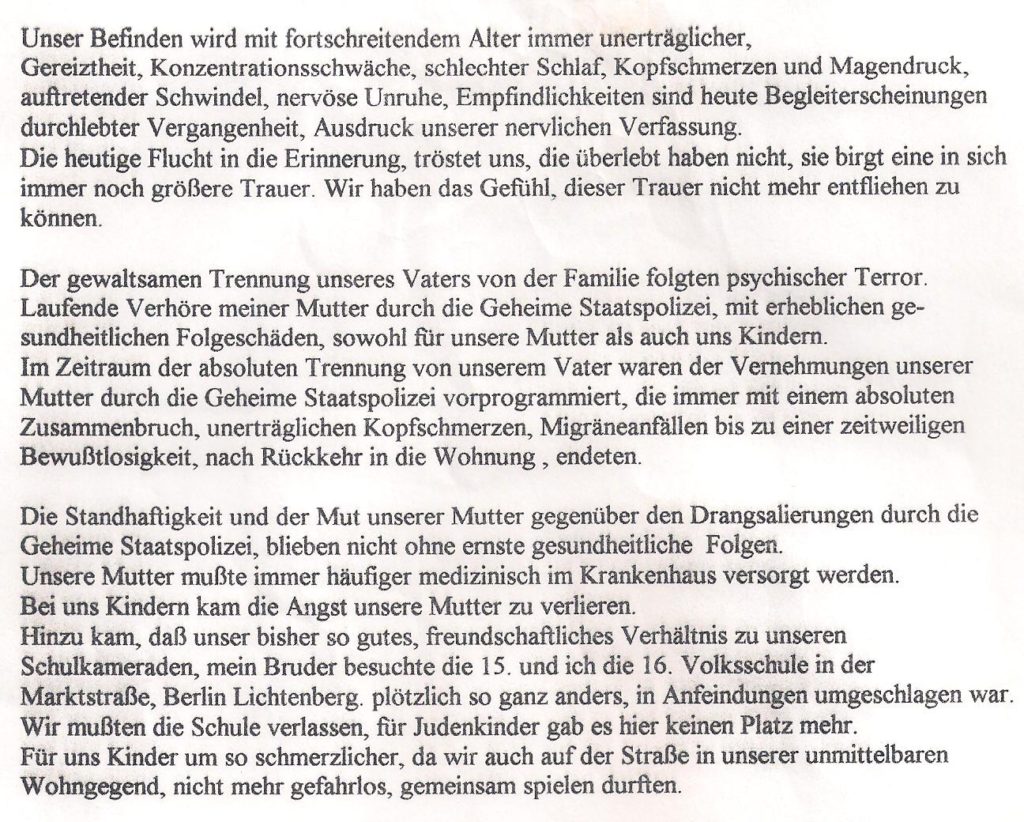
We were very lucky – I had my brother and my brother had me. When I was recovering from a serious injury on my hospital bed, we were given the terrible news. Father was gassed in the Treblinka concentration camp, Uncle Karl was murdered in a concentration camp, Mother was shot. We were both are orphans, with no one left. We were survivors of the Holocaust.
Our reunion cannot be described – a human tragedy. We vowed never to be separated from each other again, no matter what may come.
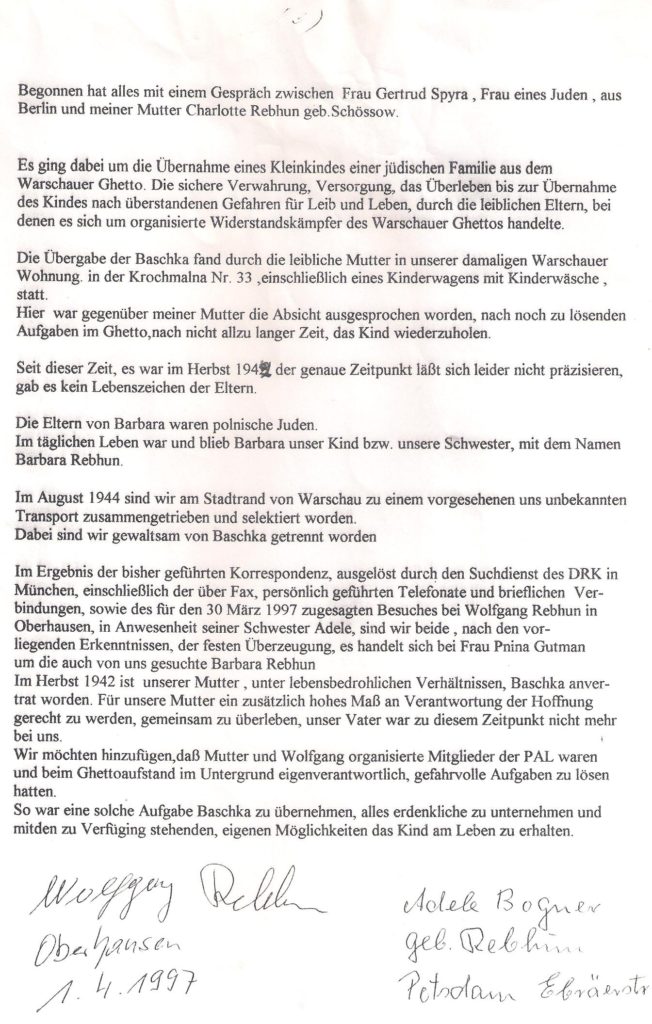
From birth up through the time we went to school, we had shared a life nestled in our family, well protected and much cared for, without emotional stress, protected by our parents, as was so common in every other well-functioning family. We were a satisfied, happy family, with a modest income, and provided for by both parents through their initiative, connectedness, prudence and diligence. Our parents were, and remain for us children, without doubt, true role models in terms of their deeds especially in times of persecution, successfully using their personal lives to assist others persecuted by the Nazi regime. Until 1938 we lived in Lembachstrasse 6 in Berlin-Lichtenberg.
Our family members were:
Our Father – Max Rebhun – Trade Merchant – born 29 January 1906
Our Mother – Charlotte Rebhun born Schössow, Saleswoman – born 5 September 1908
Son – Wolfgang – born 27 November 1927
Daughter – Adele – born 10 October 1930
Uncle Karl (Kiwa), my father’s brother who was a regular guest with us, lived up to his arrest at No. 1 Gormannstr. in Berlin. Uncle Charles was born on 13 May 1892.
On Kristallnacht, November 8, 1938, at 4:30 am, our father was arrested as a Jew, taken from our apartment in Berlin at 6 Lembachstrasse, and transported with a group to Poland. Two policemen from the police station in the Boxhagenerstrasse, demanded official entry [to our apartment]. Mother was asked to bring along warm things for Father, because he would be most likely be away for a long time.
From the police station he went with the group to the train station. My mother followed the transport at a careful distance. As a result of the arrest, our mother searched for Uncle Karl, who immediately hid himself in our apartment so that he was initially able to avoided arrest.
The arrest and detention of our father was a completely new situation for those of us who had remained behind. We were in shock, felt despair, and at the same time, anger and anxiety, but were powerless. Our situation was then and is still now an intolerable mental burden.
As we have aged, our condition has become more and more unbearable. Irritability, lack of concentration, poor sleep, headaches, and stomach problems, dizziness, restlessness, sensitivities are the consequences today of what we have lived through, an expression of our nervous constitution.
Today’s flight into memory harbors still a greater grief about those who have not survived. We feel that we can no longer escape this sorrow.
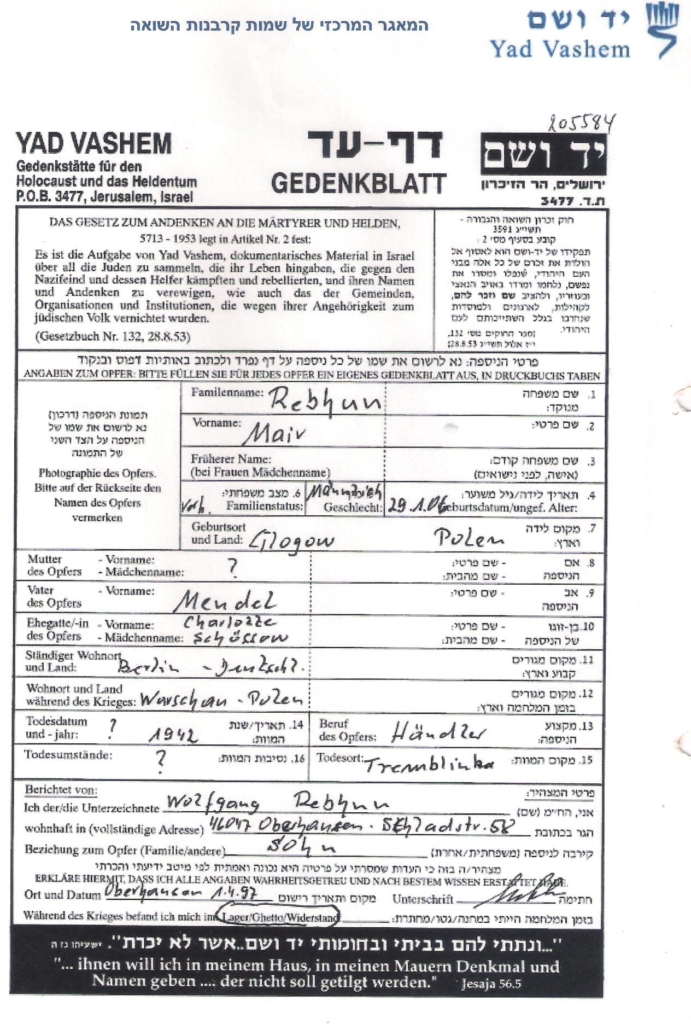
The forced separation of our Father from our family was followed by psychological terror. Constant interrogation of my mother by the Gestapo resulted in significant health problems for both our mother and us children.
During the period of absolute separation from our Father, our mother’s interrogations were orchestrated by the secret police, and after she returned to our apartment, always ended with her absolute collapse, with unbearable headaches, migraines, even a temporary loss of consciousness.
The steadfastness and courage of our mother during her harassment by the Secret State Police was not without serious consequences to her health. Our mother sought more and more medicine from the hospital.
We children began to fear we would lose our mother.

In addition, up to that time, we had such a good, friendly relationship with our school friends. My brother attended the 15th and I attended the 16th elementary school in Market Street, Berlin-Lichtenberg. Suddenly things were so different, conditions changed. We had to leave school – there was no more room for Jewish children. For us children it was all the more painful because it was no longer safe to play together outside in the street in our immediate neighborhood.
It all started with a conversation between Mrs. Gertrude Spyra, wife of a Jew from Berlin, and my mother, Charlotte Rebhun born Schössow.
The conversation involved the adoption of a small child of a Jewish family from the Warsaw Ghetto – the safekeeping and the survival of the child until its retrieval after surviving threats to life and limb. The birth parents were organized resistance fighters in the Warsaw ghetto.
The handover of Baschke by the birth mother took place in our former apartment in Warsaw Krochmalna No. 33, and included a baby stroller with baby clothing.
The intention was presented to my mother, that after taking care of their responsibilities in the Ghetto, the parents would return for the child after not too long a period of time.
After that, in the fall of 1942 – the exact time unfortunately, does not come to mind – there was no sign of the parents. Barbara’s parents were Polish Jews.
In daily life Barbara was our child and our sister, with the name Barbara Rebhun.
In August 1944, we were rounded up for a scheduled, yet for us, unexpected transport. We went through a selection on the outskirts of Warsaw during which we were forcibly separated from Baschka.
As a result of earlier correspondence initiated by the German Red Cross in Munich, including faxes, personal telephone calls, and letters, on March 30, 1997 the anticipated reunion occurred with Wolfgang Rebhun in Oberhausen, in the presence of his sister Adele. We are both strongly convinced, based on the evidence, that Mrs. Pnina Gutman is our long-sought Barbara Rebhun.
In the fall of 1942, our mother took Baschka in under life-threatening conditions. For our mother it was an additional important responsibility, considering her hope that we would survive together. Our father was at this time no longer with us.
We would like to add that Mother and Wolfgang were organized members of PAL and had the responsibility for perilous tasks for the Underground during the Ghetto uprising.
It was such a responsibility for her to take Baschka, to do everything imaginable to keep the child alive.
Wolfgang Rebhun Adele Bogner
Oberhausen geb. Rebhun
1.4.1997 Potsdam Ebraestr.
Charlotte Rebhun was executed by the SS in 1945 after returning to Berlin. On November 10, 1997, Yad Vashem recognized her as Righteous Among the Nations.
Wolfgang died in 2007; Adele died in 2010.
To be continued.
Part I: Who Am I? What is My Name? Pnina, Otwoc, and the Kaczmareks
Part II: Who Am I? What is My Name? Pnina, Wolfgang, and the Warsaw Ghetto
Part III: Who Am I? What is My Name? Gertrude and Sonia Spyra
Part IV – Who Am I, What is My Name? Wolfgang & Adele’s Eyewitness Account
Part V – Who Am I, What is My Name? Gertrude and Sonia’s Escape
Part VI – Who Am I, What is My Name? Our Search for Gertrude Spiro
Part VII – Who Am I? What is My Name? Gertrude’s Other Children?
Part VIII – Who Am I? What is My Name? Gertrud and Leo’s Trial
Part IX – Who Am I? What is My Name? Gertrude’s Sisters!
Part X: Who Am I? What is My Name? Gertrude’s Marriage and Divorce
Part XI: Who Am I? What is My Name? Berlin, Warsaw, and the German Soldier

5 Responses